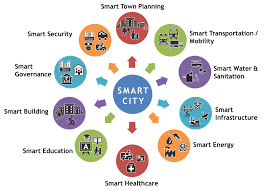Smart Cities Solutions: Transforming Urban Living
In today’s rapidly urbanizing world, the concept of smart cities is gaining momentum as a solution to the challenges faced by urban areas. Smart cities leverage technology and data to enhance the quality of life for residents, improve sustainability, and optimize resource management. From efficient transportation systems to advanced security measures, smart cities are revolutionizing urban living in profound ways.
One of the key components of smart cities is intelligent transportation systems. These systems use real-time data and analytics to manage traffic flow, reduce congestion, and enhance public transportation services. Smart traffic lights that adjust timings based on traffic volume, integrated public transport networks with real-time updates, and smart parking solutions are just a few examples of how technology is transforming mobility in urban areas.
Another crucial aspect of smart cities is sustainable energy management. By integrating renewable energy sources such as solar power and implementing energy-efficient infrastructure, smart cities aim to reduce carbon emissions and minimize environmental impact. Smart grids enable efficient energy distribution, while IoT devices monitor energy consumption in real-time, allowing for better resource allocation and cost savings.
Enhancing public safety is also a priority for smart cities. Advanced surveillance systems equipped with AI-powered analytics help law enforcement agencies respond more effectively to incidents and prevent crimes. Emergency response systems that utilize geolocation data and predictive analytics ensure quick assistance during emergencies, improving overall safety in urban environments.
Furthermore, smart cities focus on improving the quality of life for residents through innovative solutions such as connected healthcare services and smart waste management. Telemedicine platforms enable remote consultations with healthcare providers, while sensor-based waste bins optimize garbage collection routes and reduce landfill overflow.
In conclusion, smart cities solutions are reshaping urban landscapes by harnessing the power of technology to create sustainable, efficient, and livable environments. As more cities around the world embrace this transformative approach, we can expect to see significant improvements in infrastructure, services, and overall well-being for urban dwellers.
Transformative Benefits of Smart City Solutions: Enhancing Mobility, Safety, Sustainability, and Quality of Life
- Improved urban mobility through intelligent transportation systems
- Enhanced public safety with advanced surveillance and emergency response systems
- Increased energy efficiency and sustainability with smart energy management
- Optimized resource utilization for better waste management and environmental conservation
- Integrated healthcare services for improved access to medical assistance
- Enhanced connectivity and communication through IoT devices and smart grids
- Efficient public services delivery through data-driven decision-making processes
- Enhanced quality of life for residents with innovative technology solutions
Challenges of Smart Cities: Privacy, Cost, Security, Accessibility, and Technological Dependency
- Privacy concerns due to extensive data collection and surveillance in smart cities.
- High initial investment costs for implementing smart city infrastructure and technologies.
- Potential cyber security vulnerabilities that could be exploited by hackers or malicious actors.
- Digital divide issues where certain populations may not have access to or benefit from smart city solutions.
- Dependency on technology that may lead to disruptions in services during system failures or outages.
Improved urban mobility through intelligent transportation systems
Improved urban mobility through intelligent transportation systems is a significant benefit of smart cities solutions. By utilizing real-time data and advanced analytics, these systems optimize traffic flow, reduce congestion, and enhance the overall efficiency of public transportation networks. Smart traffic lights that adapt to changing traffic patterns, integrated public transport systems with seamless connectivity, and smart parking solutions contribute to a smoother and more sustainable urban mobility experience. This not only improves the quality of life for residents by reducing travel times and enhancing accessibility but also helps in minimizing environmental impact by promoting the use of public transport over private vehicles.
Enhanced public safety with advanced surveillance and emergency response systems
Enhanced public safety with advanced surveillance and emergency response systems is a significant advantage of smart cities solutions. By leveraging cutting-edge technology such as AI-powered analytics and real-time monitoring, smart cities can proactively identify and respond to security threats, emergencies, and criminal activities. These advanced surveillance systems enable law enforcement agencies to have better situational awareness, leading to quicker response times and more effective crime prevention strategies. Additionally, integrated emergency response systems equipped with geolocation data and predictive analytics ensure rapid assistance during critical situations, ultimately enhancing overall safety and security for residents in urban areas.
Increased energy efficiency and sustainability with smart energy management
Increased energy efficiency and sustainability with smart energy management is a significant pro of smart cities solutions. By leveraging advanced technologies such as smart grids, IoT devices, and renewable energy sources, smart cities can optimize energy consumption, reduce wastage, and lower carbon emissions. Real-time monitoring and data analytics enable better decision-making regarding energy distribution and usage, leading to cost savings for both residents and city authorities. This proactive approach to energy management not only improves the overall sustainability of urban areas but also contributes to a greener future by promoting the adoption of eco-friendly practices.
Optimized resource utilization for better waste management and environmental conservation
Optimized resource utilization in smart cities solutions plays a crucial role in improving waste management practices and promoting environmental conservation. By implementing innovative technologies such as sensor-based waste bins and smart collection systems, cities can efficiently manage waste disposal processes, reduce landfill overflow, and minimize environmental impact. Real-time data analytics enable authorities to identify trends in waste generation, optimize collection routes, and allocate resources more effectively. This proactive approach not only enhances the cleanliness of urban areas but also contributes to sustainable environmental practices by promoting recycling and reducing carbon footprint.
Integrated healthcare services for improved access to medical assistance
Integrated healthcare services in smart cities offer a transformative solution by enhancing access to medical assistance for residents. Through the integration of technology and data-driven systems, individuals can benefit from seamless and efficient healthcare services. From remote consultations with healthcare providers to real-time monitoring of health conditions, smart cities solutions ensure that medical assistance is readily available and easily accessible. This proactive approach not only improves the overall well-being of residents but also contributes to a healthier and more connected community.
Enhanced connectivity and communication through IoT devices and smart grids
Enhanced connectivity and communication through IoT devices and smart grids are significant advantages of smart cities solutions. By integrating Internet of Things (IoT) devices into urban infrastructure, cities can gather real-time data on various aspects such as energy consumption, traffic flow, and environmental conditions. This data enables informed decision-making and efficient resource management. Smart grids facilitate seamless communication between energy producers, distributors, and consumers, optimizing energy distribution and reducing wastage. Overall, these technologies enhance connectivity among different systems and improve communication channels, leading to a more interconnected and efficient urban environment in smart cities.
Efficient public services delivery through data-driven decision-making processes
Efficient public services delivery through data-driven decision-making processes is a significant advantage of smart cities solutions. By leveraging data analytics and technology, city administrators can gain valuable insights into citizen needs and preferences, enabling them to allocate resources effectively and prioritize service delivery. This approach not only streamlines public services such as waste management, transportation, and healthcare but also enhances transparency and accountability in governance. Data-driven decision-making empowers smart cities to respond proactively to emerging challenges, optimize service efficiency, and ultimately improve the overall quality of life for residents.
Enhanced quality of life for residents with innovative technology solutions
Smart cities solutions offer residents an enhanced quality of life through innovative technology solutions that streamline daily activities and improve overall well-being. From smart transportation systems that reduce commute times and ease traffic congestion to connected healthcare services that provide convenient access to medical assistance, smart cities leverage cutting-edge technologies to enhance convenience, efficiency, and comfort for residents. By integrating IoT devices, data analytics, and automation, smart cities empower individuals to lead healthier, safer, and more sustainable lifestyles in urban environments.
Privacy concerns due to extensive data collection and surveillance in smart cities.
One of the significant drawbacks of smart cities solutions is the growing privacy concerns stemming from extensive data collection and surveillance practices. In the quest for enhancing efficiency and security, smart cities rely heavily on gathering vast amounts of data through sensors, cameras, and other IoT devices. This constant monitoring raises valid worries about individual privacy rights, as personal information and activities can be captured, stored, and potentially misused without consent. The pervasive surveillance in smart cities can lead to a sense of constant monitoring and intrusion into private lives, raising questions about data security, transparency, and the potential for abuse by authorities or malicious actors.
High initial investment costs for implementing smart city infrastructure and technologies.
One significant drawback of smart cities solutions is the high initial investment costs required for implementing smart city infrastructure and technologies. Building a smart city involves deploying a wide range of interconnected systems, including IoT devices, sensors, data analytics platforms, and communication networks, which can be financially burdensome for governments and municipalities. The need for specialized expertise in urban planning, technology integration, and data management further adds to the overall cost of transitioning to a smart city model. As a result, many cities may face challenges in securing adequate funding and resources to kickstart their smart city initiatives, potentially delaying the realization of the long-term benefits associated with smart urban development.
Potential cyber security vulnerabilities that could be exploited by hackers or malicious actors.
One significant con of smart cities solutions is the potential cyber security vulnerabilities that could be exploited by hackers or malicious actors. As smart cities rely heavily on interconnected networks and data sharing, they become prime targets for cyber attacks. Hackers could infiltrate critical systems such as transportation, energy grids, or surveillance networks, leading to disruptions in services, data breaches, or even safety risks for residents. The interconnected nature of smart city infrastructure also means that a breach in one system could have cascading effects on others, amplifying the scale of potential damage. Addressing these cyber security vulnerabilities is crucial to ensure the integrity and resilience of smart city solutions in the face of evolving cyber threats.
Digital divide issues where certain populations may not have access to or benefit from smart city solutions.
One significant con of smart cities solutions is the digital divide issue, which can exacerbate existing inequalities within urban populations. Certain marginalized communities or low-income groups may not have equal access to the technology and infrastructure required to benefit from smart city solutions. This disparity in access to digital resources can further widen the gap between those who can fully utilize the advantages of smart cities and those who are left behind, leading to social exclusion and inequity. Addressing the digital divide is crucial to ensure that all residents have equal opportunities to participate in and benefit from the advancements of smart city initiatives.
Dependency on technology that may lead to disruptions in services during system failures or outages.
One significant con of smart cities solutions is the dependency on technology, which can potentially result in disruptions in services during system failures or outages. In a highly interconnected and technology-dependent environment, any malfunction or breakdown in the underlying systems can have far-reaching consequences, impacting essential services such as transportation, energy management, public safety, and more. The overreliance on complex technological infrastructures leaves smart cities vulnerable to cyberattacks, technical glitches, and natural disasters that could disrupt normal operations and compromise the overall functionality of the city. This inherent risk underscores the importance of implementing robust backup systems and contingency plans to mitigate the potential impact of service disruptions on residents and businesses.



